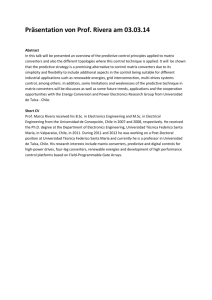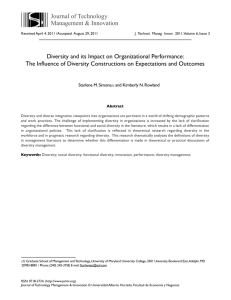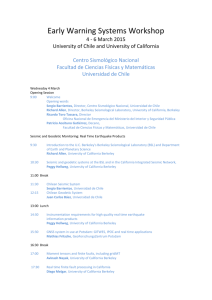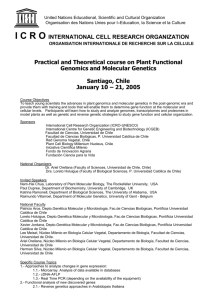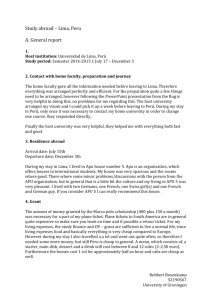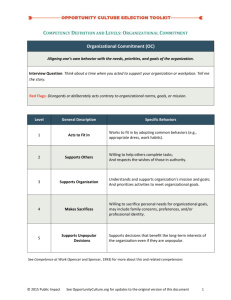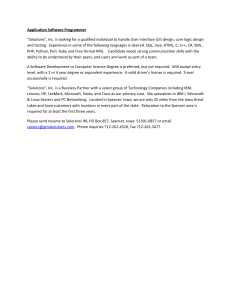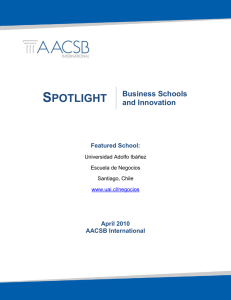international business
advertisement
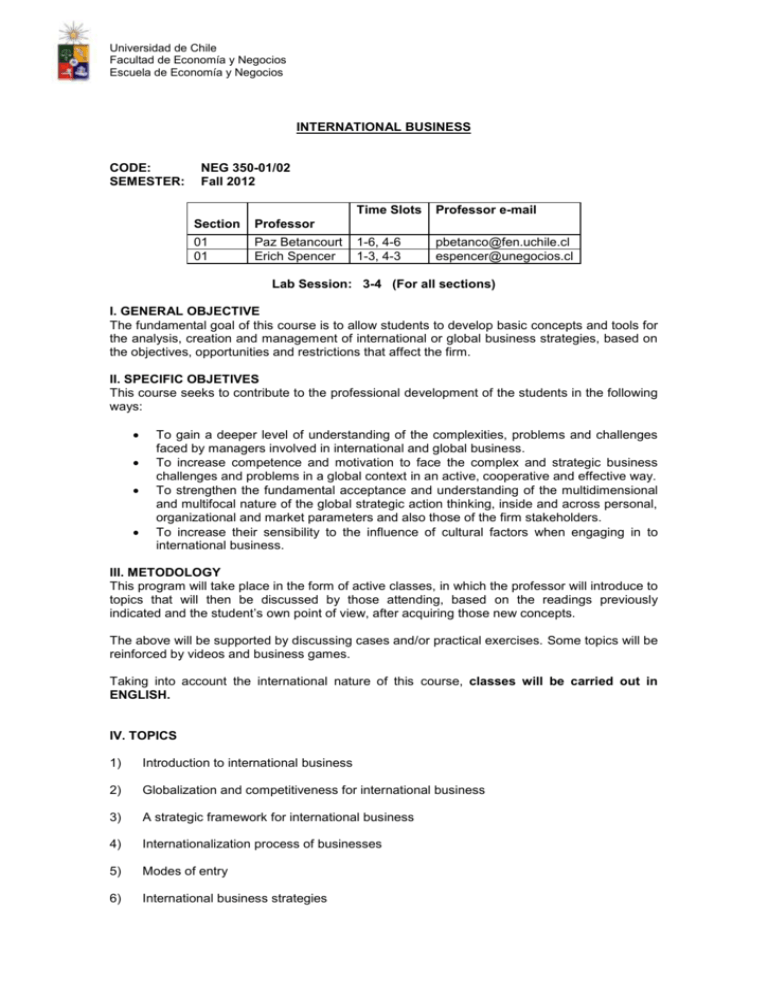
Universidad de Chile Facultad de Economía y Negocios Escuela de Economía y Negocios INTERNATIONAL BUSINESS CODE: SEMESTER: NEG 350-01/02 Fall 2012 Section Professor 01 01 Paz Betancourt Erich Spencer Time Slots Professor e-mail 1-6, 4-6 1-3, 4-3 pbetanco@fen.uchile.cl espencer@unegocios.cl Lab Session: 3-4 (For all sections) I. GENERAL OBJECTIVE The fundamental goal of this course is to allow students to develop basic concepts and tools for the analysis, creation and management of international or global business strategies, based on the objectives, opportunities and restrictions that affect the firm. II. SPECIFIC OBJETIVES This course seeks to contribute to the professional development of the students in the following ways: To gain a deeper level of understanding of the complexities, problems and challenges faced by managers involved in international and global business. To increase competence and motivation to face the complex and strategic business challenges and problems in a global context in an active, cooperative and effective way. To strengthen the fundamental acceptance and understanding of the multidimensional and multifocal nature of the global strategic action thinking, inside and across personal, organizational and market parameters and also those of the firm stakeholders. To increase their sensibility to the influence of cultural factors when engaging in to international business. III. METODOLOGY This program will take place in the form of active classes, in which the professor will introduce to topics that will then be discussed by those attending, based on the readings previously indicated and the student’s own point of view, after acquiring those new concepts. The above will be supported by discussing cases and/or practical exercises. Some topics will be reinforced by videos and business games. Taking into account the international nature of this course, classes will be carried out in ENGLISH. IV. TOPICS 1) Introduction to international business 2) Globalization and competitiveness for international business 3) A strategic framework for international business 4) Internationalization process of businesses 5) Modes of entry 6) International business strategies Universidad de Chile Facultad de Economía y Negocios Escuela de Economía y Negocios V. BASIC BIBLIOGRAPHY BOOKS “International Business, Environments and Operations.” John D. Daniels and Lee H. Radebaugh, Edit. Addison-Wesley, Eighth Edition 2009. "International Management: managing across borders and cultures", Helen Deresky, Edit. Prentice Hall, third. Edition, 2000. (HD) APUNTES: 15440-15484-15485. ARTICLES "The Hidden Challenge of Cross-Border Negotiations", James K. Sebenius, Harvard Business Review, March 2002. (JS) "Distance Still Matters – The Hard Reality of Global Expansion", Pankaj Ghemawat, Harvard Business Review, September 2001. (PG) "Building an Effective Global Business Team", Vijay Govindarajan and Anil K. Gupta, MIT Sloan Management Review, Summer 2001. (GG) "Language Learning and International Business", Darla Domke-Damonte, S.A.M. Advanced Management Journal, Winter 2001. (DD) Entrevista con John Quelch, Harvard Deusto Business Review, Noviembre-Diciembre 2000. (JQ) "La Globalizacion de los Mercados", Theodore Levitt, Harvard Deusto Business Review, Especial 100. (TL) "The Lure of Global Branding", David A. Aaker and Erich Joachimsthaler, Harvard Business Review, November- December 1999. (AJ) "Silent Language", Edward T. Hall, Harvard Business Review, May-June 1960. (EH) ”Globalización de la publicidad en Chile", Erich Spencer E. Revista Nexos. U Austral, Volumen 3, N° 2, Primavera 1996. (RN) "Ejecutivos para los negocios internacionales: obstáculos y posibilidades", Erich Spencer R. Facultad de Ciencias Económicas y Administrativas de la Universidad de Concepción, N° 54, Junio de 2000. (CO) "Siete Mitos que sopesar antes de optar por la Globalización", Subramanian Rangan, Serie Management en Planificación Estratégica, El Diario y Financial Times, N° 10, Pág. 1-6. Comentario Profesor Erich Spencer. (PE) "Las Estructuras detrás de las Compañías Globales", Julian Birkinshaw, Serie Nuevas Tendencias de Management 2001, El Diario y Financial Times, N° 2, Pág. 1-6. Comentario Profesor Erich Spencer. (MA) "El Nuevo Lenguaje de los Mercados Emergentes", Niraj Dawar y Amitava Chattopadhyay, Serie Mastering Management, El Diario y Financial Times, N° 11, Pág. 1-6. Comentario Profesor Erich Spencer. (SM) "Evaluación de eficiencia de los Canales de Exportación", Documento Docente, Departamento de Administración, Facultad de Ciencias Económicas y Administrativas de la Universidad de Chile, 1990 (ES1) VI. ADDITIONAL BIBLIOGRAPHY "Globalización: Estrategias para obtener una ventaja competitiva internacional", George S. Yip, Editorial Norma, 1993. (GY) "Administración de la Mercadotecnia Internacional", Lecturas y casos, Robert D. Buzzel y John A. Quelch, Addison-Wesley Iberoamericana, 1992. (BQ) "Marketing Global", Warren Keegan, Quinta Edición, Prentice Hall, 1997. (WK) "The Cultural Enviroment of Internacional Business", Vern Terpstra, South Western Publishing Co., 1978. (VT) ("La Gestión en un Mundo Globalmente Conectado", Rosabeth Moss Kanter, Harvard Deusto Business Review, Especial 100. (RM) Universidad de Chile Facultad de Economía y Negocios Escuela de Economía y Negocios VII. Complementary Articles ("Perfil exportador de empresas manufactureras en Chile", Erich Spencer R., Facultad de Ciencias Económicas y Administrativas de la Universidad de Concepción. Año XXXIV, N° 48, Junio de 1997. "Amcham Firms and their Human Resources", Erich Spencer R. y Sergio Olavarrieta S. The Journal, (Chilean-American Chamber of Commerce), N° 156, August 1998. “Impact of Amcham Companies in Chile myths and realities” Erich Spencer R y Sergio Olavarrieta S. The Journal. (Chilean American Chamber of Commerce). Nª 157, September 1998. “Ejecutivos para los negocios internacionales y obstáculos y posibilidades”, Revista de la Facultad de Ciencias Económicas y Administrativas de la Universidad de Concepción, Nª 54, Junio de 2000. VIII. EVALUATION (TBC) The following assessments should take place during the semester: Mid-Term Exam 1 25% Exercises, homework and reading control 15% Cases (written reports) 10% Business game including final workshop 20% Participation in class 30% Presentation grade : 100 % Final Exam Pass/Fail/Receives presentation grade IX. COURSE RULES 1. Classes will take place on the days the undergraduate business school defines and their topics will be presented by the course’s professor, who will also invite guest lecturers. 2. Attendance to classes must be at least 85%. In spite of that, due to the nature of the course, regular attendance to classes and lab session is recommended. Likewise, punctuality is expected, and therefore the entry of students being late is not allowed. Leaving early isn’t allowed either. It’s also essential that every student checks Docenciaweb on a daily basis, as its content is assumed as known by all. “Not having checked” the website will not be allowed as an excuse. 3. For every class session, students must have read and studied the corresponding bibliography. They should also keep informed about current events concerning business and their environment. To achieve this, students should at least read local press like El Mercurio, El Diario and Estrategia. 4. The professor keeps the right to add, eliminate or replace bibliography as the semester unfolds, if he thinks it is for the course’s best interest. 5. The mid-term exam and the final exam are common to both courses. 6. Any absence from the mid-term exam, following justification from the undergraduate business school, will be replaced by an oral interrogation due by the end of the semester (to be assessed from 1,0 to 6,0). Attendance to lectures is mandatory and its content might be evaluated on the mid-term exam and the Final Exam. 7. Medical or other related justifications for the absence to any requirement must be presented though the regular channels established by the undergraduate business school. Universidad de Chile Facultad de Economía y Negocios Escuela de Economía y Negocios 8. The Final Exam has ONLY ONE DATE designated by the undergraduate business school. If a student cannot attend, she or he should give a written notice to the professor during the 24 hrs. following the Exam, without prejudice to the forgoing point. The exam will define the final situation of the student (passing/failing). 9. It is important to stress that each student must take responsibility for his/her fulfilling of the program, especially in what’s related to: Be up to date on the classes and instructions given by the professor or the course’s assistants. For instance, missing a class doesn’t exempt the student from the obligations given that day. To fulfill the dates and deadlines of the evaluation activities. After established and published, dates will not be changed. Obtain the support material needed for the course. 10. LATE HOMEWORK IS NOT ACCEPTED, NO MATTER WHAT. An appropriate management of time is a very important ability in this course and also in professional life, so be prepared for everything that might go wrong on the last minute (defective printers, computer viruses, traffic gridlocks, slow buses, etc.) 11. Those who join the course on a later date must assume the fact in how it affects his personal attendance ratio and evaluations. 12. Final Exam Exemption Policy: Only students with high performance, over 4.0 in every evaluation, good attendance ratio and that have had their evaluations in their original date might apply. Important: To fulfil the course requirements, special relevance will be given to making the students generate analytic abilities that allow them to add academic value to the course’s obligations. Therefore, and following the School´s policy, any kind of plagiarism or any attempt to pass somebody else’s work as one’s own will be graded with a 1.0, failing the course. X. INTERNET RESOURCES AND DATABASES DATABASES (www.uchile.cl) 1. 2. 3. 4. 5. EBSCO Proquest Science Direct Ocenet Emerald WEBSITES 1. 2. 3. 4. 5. 6. 7. 8. 9. 10. 11. 12. 13. www.loc.gov (US Library of Congress) www.executiveplanet.com (Business customs) http:+/www.transparency.org/ (Transparency International) http://www.international-business-center.com/ http://www.austlii.edu.au/ (Free database) http://www.wopldlii.org/catalog/ (Free legal database) http://www.bancomundial.org (World Bank, in spanish) www.worldbank.org (World Bank) http://www.eclac.org (Comisión Económica para América Latina y el Caribe) http://www.imf.org/ (International Monetary Fund) http://www.wto.org (World Trade Organization) http://www.odci.gov/cia/publications/factbook/ (The World Factbook) http://www.eia.doe.gov/emeu/cabs/contents.html (Energy Information Administration) Universidad de Chile Facultad de Economía y Negocios Escuela de Economía y Negocios 14. 15. 16. 17. 18. 19. 20. 21. 22. 23. 24. 25. 26. 27. http://www.state.gov (U.S. Department of State) http://www.apecsec.org.sg/ (APEC) http://www.apectariff.org/ (APEC Tariff Database) http://www.aseansec.org/home.htm (ASEAN) http://www.kantei.go.jp/foreign/link/links_e.html (Japanese Government links) http://www.un.org/spanish/ (United Nations) http://www.prochile.cl/ (ProChile) http://www.funpacifico.cl (Fundación Chilena del Pacífico) http://www.chinatoday.com/ (China Today) http://www.gio.gov.tw/ (Taiwan Government Info) http://www.austrade.gov.au/ (Australian Trade Commission) http://www.kois.go.kr/ (Korea Net) http://www.thaigov.go.th/index-eng.htm (Royal Thai Government) http://www.bcentral.cl/esp/ (Banco Central de Chile)
